Kissing Books: Monster mash
Every month, Olivia Waite pulls back the covers, revealing the very best in new, and classic, romance. We're extending a hand to you. Won't you take it? And if you're still not sated, there's always the archives.
October is an ideal time to talk about monsters. Both the literal kind — Beauty and the Beast is one of the great narrative threads of the romance genre — and the more metaphorical kind. Romance has plenty of both. We have werewolves and bear-shifters and aliens and paranormal characters with terrifying abilities. And we have frighteningly powerful men: dukes and billionaires and SEALs and cops and warriors and spooky house owners who may have murdered their first wives (or just keep her imprisoned in the attic, pick your poison). Less commonly, but more interestingly, we have monstrous women: abusive mothers and unrelatable heroines, emotionally broken creature hunters and ice queens and traumatized women whose survival has turned them bitter or cold or suspicious.
It is impossible to add up every kind of monstrousness in romance and get a clean, unambiguous result about being a monster means. Every book that grapples with it reinvents the definition to some degree. You have to take it case by case: Are the monsters the heroes, or the villains, or is it a mix? (Paranormal worlds do a lot of the latter, as we’ll see in this month’s books). Watching who self-identifies as a monster can be instructive: plenty of villains do it, yes, but plenty of leads do it too only to be proven wrong and reclaim their humanity.
And sometimes, monsters fall in love with other monsters, because romance is flexible like that.
Sci-fi authors have written a million robot books to ask questions about how sentience is defined, claimed, and created. When exactly does a machine become a person? Where does humanity begin?
Romance’s monsters, all of them, explore the opposite problem: When does humanity end? At what point have you gone too far for love to bring you back again?
Take the dark romance subgenre, which has featured romances for Nazi and Stasi love interests, serial killers, kidnappers, stalkers, rapists, current gang members, sex traffickers… You get the picture. Conversation around these stories often borrows from therapeutic language: they’re a way of facing fears in safety, or they’re a way of processing trauma and/or stigmatized desires. Or conversely they’re deeply unhealthy and contribute to the worst impulses of rape culture and toxic masculinity. Or maybe they’re both.
There’s no succinct answers here, either: is that medicine you’re drinking or poison? Sometimes the difference is only a question of dosage.
And there’s certainly a few examples of dark romances like the Stasi hero, whose function is to make terrible men seem palatable. He’ll hurt everyone but you — or he’ll only hurt you for your own good. It may be a fascinating challenge for the writer, but… it feels less than healthy, to me. Not because I need my stories to be perfectly hygienic or sanitary — I love Macbeth, for instance — but because romance as a genre exists to show that the leads belong together, and that means ethically they have to deserve one another. Don’t they? I have an extremely hard time believing, even in fictional settings, that survivors deserve to live as partners with their torturers, or that they can do so safely. At what point are these stories treating the symptoms of toxic masculinity, rather than the disease? Are dark romances a therapy, or merely an anaesthetic?
Forgiveness may be divine, but we’re only humans here.
Personally, I tend to prefer literal monsters who are profoundly human underneath, despite the fur and the fangs. Shelly Laurenston’s aggressively horny shifters, for example, or Gomez and Morticia Adams, whose love language is innuendo about murder and torture. I have a harder time with emotional monsters: people who abuse their power over others, people who demand submission and not in the fun way, people with unacknowledged anger issues and bloody backstories and inhuman aspects that seem to be normalized in the text. But as with everything in romance, there are exceptions: this month’s books include some doozies. We’ve got a badass sci-fi heroine who’s not quite the girl she used to be; a noir hero who falls in love with a vicious assassin with golden eyes; a blacksmith heroine with huge shoulders and a cheerfully murderous attitude; and one of the single most terrifying and lovable alpha heroes I’ve ever read. And one short, sweet book about two quieter souls who fall in love in a world where they’re the only people who aren’t monsters — because I had to have some fluff in here, after all, even in the spookiest month.
Venture forth — if you dare.
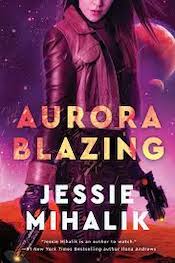
Aurora Blazing by Jesse Mihalik (Harper Voyager: sci-fi m/f):
Disclosure: Jesse Mihalik and I share a publisher and an editor.
February’s Polaris Rising was one of the best action-filled sci-fi romances I’ve read in some time; Aurora Blazing is even better. It continues events from the first book, so you probably lose a little if you go in as a standalone — but if your choice is between reading neither and just starting here, then please, I urge you, start here.
Bianca is a daughter of House Von Hasenberg, one of the four main families in the corrupt, conniving, and ultra-wealthy Consortium. Widowed, wounded, and carrying around a truly awesome secret which not even her much-loved siblings know about — seriously, it’s amazing, I love her, and I’m not telling — she plays the part of a social schemer while collecting broad-ranging intelligence and helping other people escape the kind of abusive situation she found herself in as a younger woman. Stubborn and self-protecting, she often butts heads with the House’s director of security, the too-attractive and interfering Ian Bishop, who has a few secrets of his own. Next thing you know the von Hasenburg heir has vanished, Bianca’s gone on the run and been marked as a traitor, and Ian’s been sent to capture her and bring her back to her father for justice.
It’s difficult to write a good cat-and-mouse plot with tech that hasn’t been invented yet, but Mihalik gets it just right, clear about both the obstacles and the workarounds both characters exploit while keeping the pace brisk and the blasters firing. I loved the chemistry our two leads showed in the first book, and it’s front and center here: just the right amount of pining and lust and that heartbreaking need for consolation that always twists me into delightful knots. Just a great ride from start to finish.
“You are a dead man, Ian Bishop,” I threatened.
“It wouldn’t be the first time, love,” he said, his clipped accent more pronounced than usual.
The endearment kicked me in the chest and I froze. I knew it didn’t mean anything, it was just a filler word like darling or sweetheart, but it hit on one of my secret longings. I stared straight ahead and pretended my heart didn’t ache.
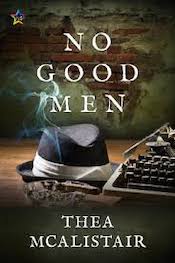
No Good Men by Thea McAlistair (NineStar Press: historical m/m):
It’s been a rough couple years in queer romance publishing: Riptide lost an editor for racism and harrassment, Dreamspinner is demonstrating extremely dodgy behavior at best, and Less Than Three Press recently made a graceful exit from the stage. Larger publishers have started buying more queer romances but it’s still a trickle where we want a pool.
All of which is to say I’m incredibly grateful for the work NineStar Press is doing: queer romance of so many subgenres and heat levels, especially speculative, with a freewheeling sense of risk-taking. Like Thea McAlistar’s noir m/m mystery, with a romance arc but no on-the-page sex, and plenty of hard-bitten cynicism.
There are detectives of brilliance: Sherlock Holmes of course, Lord Peter Wimsey and Harriet Vane, the terrifying razor blade of Miss Marple’s intuition. But I reserve a certain part of my heart for detectives who are just a bit dim, and a lot stubborn. Holly from The Third Man; the Dude from The Big Lebowski; Harry from Kiss Kiss, Bang Bang. And now Alex Dawson, a sometime pulp writer turned bodyguard, who starts poking into the murder of the mayor he was supposed to be guarding. Not out of any regard for the mayor himself, but because the other bodyguard killed was Alex’s dear friend, and he just wants to know the answer to a simple question: Why?
It’s a wonderful setup, where the publicly important death matters to us much less than the emotionally important death. Like any good noir, the personal looms larger than the political, and watching Alex cope with the assault on his rickety found family will break your heart in the best way. It’s also the first in a projected series, and I have high hopes of seeing more of this cast of characters — at least, the ones who survive. Spoilers? Sorry: this book has a higher body count than my usual recommendations. And a lot of guns. It must be said that the romance arc is definitely a bit secondary, and readers in search of fluff will want to look elsewhere.
Readers in search of something gritty but not grim, tragic but not nihilistic, will come away amply satisfied.
Sometime during my visit with Mrs. Green the weather had turned heavy and damp, threatening rain. I was almost glad. Sunlight didn’t quite match my mood. I cursed myself the whole half block it took to get to the Carlisles’ house. Suckered by an old lady, I couldn’t believe it! Well, I could, considering the amount of corruption in town. Everyone with their money and their secrets. I was almost surprised no one I knew had been murdered before.
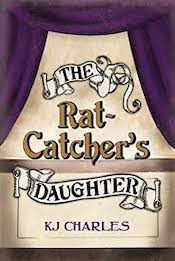
The Rat-Catcher’s Daughter by KJ Charles (self-published: historical asexual trans f/asexual m):
It’s always a risk to bare your feelings to another person, but how much more so when there’s queerness or transness to take into account, especially in times and places where those identities carry more than the usual burden of legal and social stigma. Maybe that’s why trans and ace (asexual) romance plots appeal to me so much: there always has to be a moment where the characters must be more than usually delicate with one another, because the risks of confession are so much more profound, and the characters have been hurt in just that way so many times before.
Here, that moment comes when our music hall songstress Miss Christiana and our humble clockrepairer/diamond fence Stan reveal to one another that they’re not really into the whole sex thing, never, not with anyone, just not anothing that works for them. It starts as an awkward, anxiety-filled conversation for both of them, and turns into a glowing, giggling sunburst of mutual understanding and relief. I couldn’t have liked it more.
And of course, that lovely gem of a moment shines more brightly against the grimy backdrop of Charles’ underworld family: the Lilywhite Boys (as you’ll recall from the marvelous Any Old Diamonds) would be the villains in nearly any other romance world. They cheerfully steal things; they like violence; they are the furthest thing from gentlemen. I’m glad we have this morsel of a book to keep us from getting too ravenous for the next one (Templeton and Susan, be still my heart!)
What will really upset Stan is you getting in trouble, so don’t. And don’t worry,” he added, a little more gently. “We’ll bring him back.”
She clutched his forearm. “Will he be all right?”
Templeton didn’t respond right away. “I hope so,” he said at last. “But if he’s not, I promise you, it’ll be catching.”
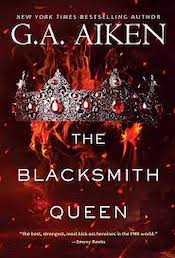
The Blacksmith Queen by G. A. Aiken (Kensington Books: fantasy m/f):
Did I describe No Good Men as a little violent? Oh, sweet summer child. This book opens with not one but two scenes of gleeful slaughter, splatteringly comic, and by the end of chapter two I had already lost count of how many skulls had been smashed and whose inside bits were splashed onto whom. It’s not at all my usual thing but all the characters seemed to be having such a good time that I couldn’t look away.
By the time the secret centaurs (what?) and the demon wolves with fire for eyes show up (what???), I was reaching for the popcorn and settling in for the whole show.
This book is not subtle, but it is gloriously surprising. It’s what you might get if Game of Thrones and Borderlands 2 had a romance baby. Or a slightly less wholesome Galavant.
At several points I actually yelled Oh shit aloud at the page, because G. A. Aiken can present a plot twist with all the finesse and brilliance of a stage magician.
We begin: The Old King has died and prophecy hails new successor — not one of the king’s murderous offspring, who immediately begin assassinating one another, but a blacksmith’s younger daughter. But we don’t follow Beatrix: the story’s centered on the Chosen One’s older sister Keeley, a tall, broad, impossibly strong and burly blacksmith like her mother. Keeley is deadly with a sledgehammer and easily makes friends with every animal, even the demon wolves. The Witches of Amhuinn have sent a clan of centaurs to defend the proespective Queen — including large, scowly, misanthropic Caid, who is utterly perplexed to find Keeley treating him with all the cheer and confidence at her disposal.
The goal is simple: get Beatrix to the witches to confirm her destiny, while avoiding capture and slaughter from the royals who are grasping for power. But then things — well, things take a turn, and the patterns you thought you were following begin shifting like a kaleidoscope. The prose is profane and filthy and utterly unself-conscious, leaving the faux-medieval tone at the door in favor of brash, direct statements.
I had forgotten that epic fantasy could be this fucking fun.
“So we’re just going to pretend those wolves don’t exist?” Laila asked.
“That’s exactly what we’re going to do!” Keeley joyfully replied. She’d just survived a battle and she felt pretty good about herself. Why ruin it all by fighting a woman she barely knew?
“Are you a witch of the dark gods?”
“Me? A witch?” Keeley had to laugh. “I have one loyalty aside from my family and it’s steel. That’s where my heart and love are.”
This Month’s Noir Detective Heroine, Paranormal Edition
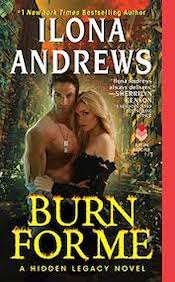
Burn for Me by Ilona Andrews (Avon: paranormal m/f):
If Nevada Baylor were not a romance heroine she would be a Raymond Chandler character. I’ll spare you the five-page essay, but I’ve got the quotes to prove it.
Noir was always a genre I loved for its best tendencies (sly wit, mysteries to solve, cityscapes, femme fatales) and in spite of its worst (misogyny, violence, xenophobia, and nihilism, not necessarily in that order). Romance-noir overlaps are few and far between: things either go Gothic and angsty, or end up as romantic suspense with its comfortable Good Versus Evil, or star a heroine who’s too much of an ingenue to support the weight of a proper noir voice.
What I’ve been missing is the heroine with an eye like Phillip Marlowe’s, which presents subtle observations in the form of biting jokes.
Such as: “She wore a white dress that really wanted to be a sleeve.”
Which is how Nevada Baylor, our down-and-out private eye in a world controlled by magical families, describes the receptionist in the ultra-modern lobby of the ultra-wealthy Montgomery International Investigations. It’s a classic noir scene, our detective showing up to a wealthy client’s office, setting up future tensions and showing us why we’re going to be rooting for this detective even when they’re haggard and human and ready to buckle beneath the weight of crime and sin and evil.
By the time our hero Mad Rogan shows up, I’m ready to burn down the world to keep Nevada safe. I’m committed. I’m invested. I’m more than a little bit in love. Any man who wants her is going to have to prove to me that he damn well deserves the honor.
Mad Rogan is not a noir hero. He’s something like a noir villain, with his wealth and his morals and his power. He’s an homme fatale, both intensely sexual and profoundly untrustworthy. And he’s fucking dangerous: a powerful high-level magic user, he calmly muses aloud at several points that people get far too worked up over a little murder here and there.
I love him to bits and I have no earthly idea why.
Seriously, I write books and about books for a living. Normally I can at least see enough of the strings to know how they’re being pulled. I generally don’t mind. Good magic’s not less fun when you know how a trick is performed. But I honestly have no idea how Ilona Andrews is pulling this one off. Just last month I was talking about being painfully tired of alpha heroes who are the Mostiest Most of everything, and power imbalances in paranormal romances, and romance arcs that take up multiple books — and here is a book where all of that seems to be true, at least on paper, and I am eating it up with a fucking spoon.
I’m going to have to read the rest of this series, and reread it until I figure it all out. My puzzle-solving, pattern-spotting, overthinking magpie mind is not going to be able to let this go. I’m actually furious at myself for not having read this years ago. If you want your brain gloriously wrecked this October, start here.
Across from me, Mad Rogan sat motionless in the circle. A damp sheen beaded at his hairline and slicked his chest and carved biceps. The blue runic script covering his body still held, but some symbols were beginning to smudge. The effort of crushing my will was wearing him out. In the soft illumination of the room, he looked barely human, a feral, predatory creature of some arcane magic. I would’ve loved nothing more than to walk over there and kick him right in the face. As it was, I glanced at him anytime the pressure got to me, and a fresh jolt of fear kept me going. The pressure ebbed slightly.
He was tired.